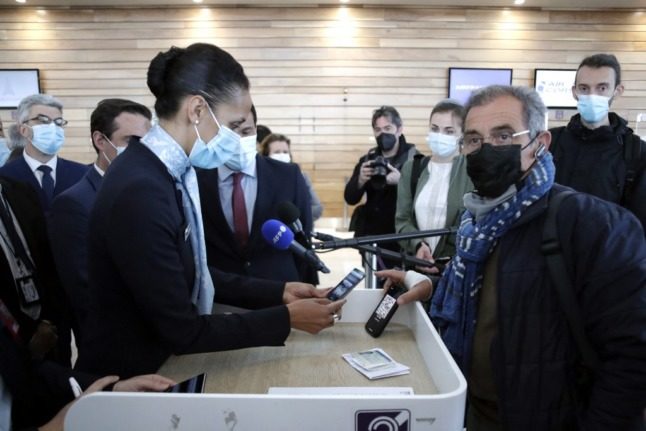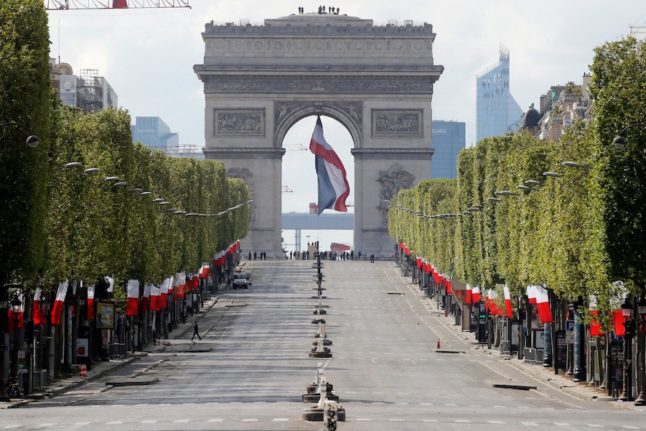The head of the European Commission said the bloc – which had blocked non-essential travel for more than a year – will this summer allow US tourists to visit.
In France there is a provisional reopening date of June 9th for travel from the USA, although this depends on the health situation.
“All 27 member states will accept, unconditionally, all those who are vaccinated with vaccines that are approved by European Medicines Agency,” European Commission President Ursula von der Leyen told the New York Times in April, outlining plans to allow US tourists to travel to Europe.
READ ALSO What’s the latest on how the EU’s vaccine passport will work in practice?
Proof of vaccination
Anyone vaccinated in a non-EU country, such as the USA, must have received a vaccine authorised by the European Medicines Agency.
The EMA has authorised the Pfizer/BioNTech, Moderna, AstraZeneca and Johnson & Johnson (known as Janssen in some countries) vaccines. So, good news for Americans hoping to travel to Europe, anyone who has had those vaccines will be fine to travel when the bloc does reopen.
As Ms von der Leyen said in that New York Times interview: “Americans, as far as I can see, use European Medicines Agency-approved vaccines. This will enable free movement and travel to the European Union.”
But the EU needs to recognise the US’s vaccination/test certificates.
It has opened talks with the USA, to ensure mutual recognition of US/EU but there is at present no formal agreement in place.
Bear in mind, also, that – despite updated advice from the CDC saying that vaccinated Americans can travel at low risk to themselves – both the US State Department and the CDC still advocate against non-essential travel.
How it will work
Making sure all certificates can be scanned and the various countries’ health passport apps ‘talk’ to each other correctly is something the EU has been working on.
It is still finalising details of its ‘digital green pass’ – while we don’t know exactly how this will work as yet, the principle is that each EU/Schengen zone country develops its own domestic app like France’s TousAntiCovid and these can all be used to produce a QR code that can be scanned at any border within the Bloc.
READ ALSO How France’s health passport will work this summer
The plan is for this to be in place from mid-June, paving the way for travel within the EU and Schengen zone from July 1st. The situation on travel from outside the EU depends on negotiations with individual countries on mutual vaccine passport recognition.
For people who don’t have a scannable code on their certificate – or don’t have a smartphone – you will be able to present paper certificates at the border.
If the certificate carries a QR code, it may be scanned, otherwise the certificate will have to be examined by an official (which will probably mean a longer queue).
This needs to be an official health authority vaccination certificate that bears the holder’s name and date of birth, dates when both doses were administered, as well as the name and batch number of the vaccine.
Once we can travel, are the rules likely to change?
It’s entirely possible. Individual countries within the EU retain the right to “quickly and temporarily” limit travel to avoid the spread of Covid variants – as a number of EU countries have already done because of the spread of the Indian variant in the UK.
They also have the right to impose extra restrictions such as testing and quarantine – even on the fully vaccinated – if the health situation demands it.
What about people who haven’t been vaccinated?
The French and the EU vaccine passports have provision to upload three things – a vaccination certificate, a recent negative Covid test or proof of having recently recovered from Covid. So people who either cannot be vaccinated or don’t want to be have the option to present instead a negative Covid test at the border.
Children under 11 do not need to present a test, but over 11s do. Since most countries are not yet vaccinating under 18s, travel abroad with children this summer will likely involve Covid tests.
For the latest on travel rules in and out of France, head to our Travelling to France section.







 Please whitelist us to continue reading.
Please whitelist us to continue reading.
My daughter lives in Paris with her husband and 2 children under 10 yrs old. She and her husband have been vaccinated. The children have not. The children (and my daughter) have French and American passports. What kind of restrictions will the children have if they have no vaccinations by the time they leave Paris around July 25th. Will they need a current test coming and going. Thanks so much for your help. Karen M.